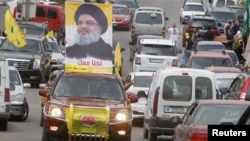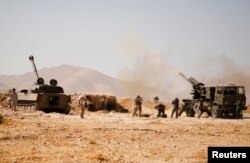A grouping of major powers urged Lebanon on Thursday to uphold a policy of keeping out of regional wars, after Iran-backed Hezbollah and its allies emerged stronger from a general election.
The International Support Group (ISG) for Lebanon, which includes the United States, Russia, China, France, Germany, Italy, Britain and European Union, also called on Lebanon to resume dialogue about a national defense strategy.
Lebanon agreed a policy of "disassociation" in 2012 to keep the deeply divided state out of conflicts such as the war in neighboring Syria. Still, the Hezbollah group is heavily involved in the war across the border, sending thousands of fighters to help Syrian President Bashar al-Assad's military.
Israel said it struck nearly all of Iran's military infrastructure in Syria on Thursday after Iranian forces fired rockets at Israeli-held territory for the first time.
"We look forward to working with the new government as it follows up on its international commitments, including under resolutions 1559 [2004] and 1701 [2006] to extend the authority of the Lebanese state across all of its national territory and to ensure its monopoly over the legitimate use of force," a joint ISG statement said.
The resolutions involve the withdrawal of all foreign forces from Lebanon, the disarmament of all militias including Hezbollah and the terms of a 2006 cease-fire agreement between Lebanon and Israel.
The United States, which has given Lebanon's army substantial support, classifies the heavily armed Hezbollah as a terrorist group and condemns its role in the Syrian conflict.
Shiite Muslim movement Hezbollah, together with parties and politicians aligned to it, won more than half the 128 seats in Lebanon's parliament Sunday.
Though Western-backed Prime Minister Saad al-Hariri lost more than a third of his seats in the election, the Sunni leader is widely expected to form another unity government that will include Hezbollah and other main parties. Talks over cabinet posts are expected to take some time.
The ISG statement also called for the new government to "move swiftly to enhance the economic climate in Lebanon by implementing structural and sectoral reform measures."
Lebanon is banking on foreign aid and loans to revive its stagnant economy, but international donors want to see reforms before they release some of the $11 billion of aid and soft loans pledged in April.
Lebanon has received sizeable Western aid to help it cope with hosting one million refugees from Syria.
President Michel Aoun said this week he intended to call dialogue to address issues including "a national defense strategy" — implying discussion of Hezbollah's arms — but without giving further details.
The staunchly anti-Hezbollah Lebanese Forces, a Christian party, emerged a winner after the vote, nearly doubling its lawmakers to around 15.






